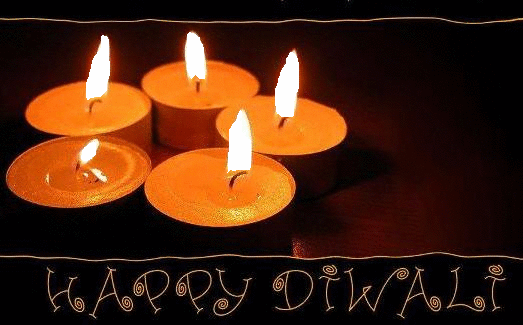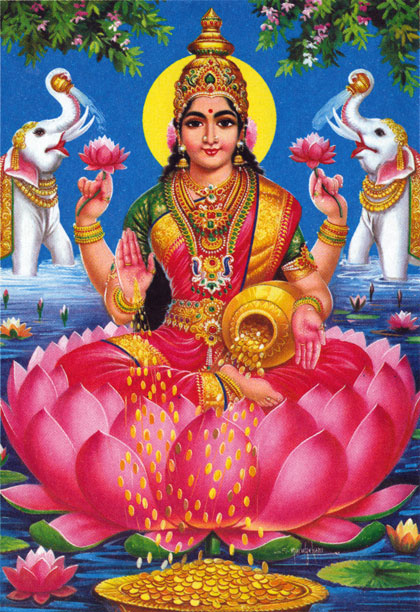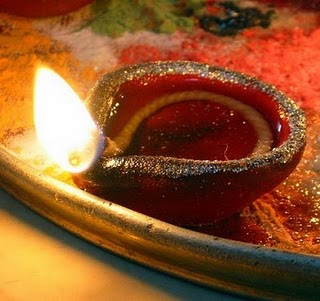Dear Devotees,
 According to Hindu reckoning, the date of Diwali falls on 15th day of the dark fortnight in the auspicious Hindu month of Kartik or the month of October/November in English calendar. This Diwali day falls on the amavasya or the no moon day. Diwali date comes 20 days after the popular festival of Dussehra or Vijaya Dashmi. According to Hindu reckoning, the date of Diwali falls on 15th day of the dark fortnight in the auspicious Hindu month of Kartik or the month of October/November in English calendar. This Diwali day falls on the amavasya or the no moon day. Diwali date comes 20 days after the popular festival of Dussehra or Vijaya Dashmi.
Diwali is an occasion wherein every member of a family is involved in the preparations weeks in advance. Right from getting the house cleaned and spruced up and painted, making elaborate rangolis, planning the special dishes, visits to the temples, friends, relatives and exchange diwali gifts. With the passage of time, Diwali has evolved into a community festival. People gather as a community for the celebrations.
Welcoming Prosperity on Deepavali
Diwali, or Deepawali, literally means rows of diyas (clay lamps). This festival is significant for its association with the uplifting of spiritual darkness in the souls of people. It also marks the beginning of the Hindu New Year and on this day Lord Ganesha, the elephant-headed Hindu god, is worshiped. On this day, doorways are lit and decorated with Rangoli or traditional patterns to welcome the Hindu goddess of wealth, Lakshmi.
Five Days Of Diwali
Diwali is a festival of joy, splendor, brightness and happiness. It is the festival of lights and is celebrated with great enthusiasm by all Indians all over the world. The uniqueness of this festival is its harmony of five varied philosophies, with each day to a special thought or ideal. People celebrate each of its five days of festivities with true understanding, it will uplift and enrich the lives.
The first day of Diwali: Dhanteras
The first day of Diwali is called Dhanvantari Triodasi or Dhanwantari Triodasi also called Dhan Theras. It is in fact the thirteenth lunar day of Krishna Paksh, the dark forthnight of the month of Kartik. On this day, Lord Dhanwantari came out of the ocean with Ayurvedic for mankind. This day marks the beginning of deepawali celebrations.
The second day of Diwali: Choti Diwali
The second day of dipawali is called Narak Chaturdasi. On this day Lord Krishna destroyed the demon Narakasur and made the world free from fear. On this day, one should massage the body with oil to relieve it of tiredness, bathe and rest so that Diwali can be celebarated with vigour and devotion.
The third day of Diwali: Lakshmi Puja on Diwali
This is the day when worship unto Mother Lakshmi is performed. Hindus cleanse themselves and join with their families and their Pandit (priest) and they worship the divine Goddess Lakshmi to achieve the blessings of wealth and prosperity, the triumph of good over evil and light over darkness.
The fourth day of Diwali: Padwa & Govardhan Puja
On this day, Govardhan Pooja is performed. Many thousands of years ago, Lord Krishna caused the people of Vraja to perform Govardhan Pooja. From then on, every year Hindus worship Govardhan to honour that first Pooja done by the people of Vraja.
The fifth day of Diwali: Bhai Duj
The fifth day of the Diwali is called Bhai teeka. This is the day after Goverdhan Pooja is performed and normally two days after Diwali day. It is a day dedicated to sisters. Many moons ago, in the Vedic era, Yama (Yamraj, the Lord of death) visited his sister Yamuna on this day. He gave his sister a Vardhan (a boon) that whosoever visits her on this day shall be liberated from all sins. They will achieve Moksha or final emancipation. From then on, brothers visit their sisters on this day to enquire of their welfare.
This day marks the end of the five days of deepavali celebrations.
Legends Of Diwali
Diwali, the festival of lights, celebrates the abundance of autumn harvest and is dedicated to various gods and goddesses. The festival also marks an important date in the Indian calendar, as the North Indian kingdom of Avadha has celebrated this as the last day of Lord Rama's long exile of fourteen years. As the citizens of Ayodhya eagerly awaited their beloved prince's return, they lit thousands of lamps to guide his flying vimana to their city. The darkest night of the year gave way to a glorious morning as Rama returned with his wife and brothers to his ancestral kingdom of Avadha.
Diwali also celebrates the gracious nature of the three goddesses, Lakshmi, Kali and Saraswati. Dhanteras (two days before Diwali) is dedicated to Lakshmi, whose blessings are essential for a prosperous, fruitful and peaceful life. Kali-Chudash (the day before Diwali) is dedicated to Maha Kali whose strength we seek to maintain the wealth we have. Strength, physical, mental and spiritual, is essential for all of us to lead a happy life. Diwali itself is dedicated to goddess Saraswati. Knowledge is the ultimate wealth, for it cannot be stolen from you; it is also the ultimate strength, for it often defeats brute force.
The Legends
Goddess Lakshmi : The Goddess of wealth, Lakshmi was incarnated on the new moon day (amaavasyaa) of the Kartik month during the churning of the ocean (samudra-manthan), hence the association of Diwali with Lakshmi.
Vishnu Rescued Lakshmi: On this very day, Lord Vishnu in his fifth incarnation as Vaman-avtaara rescued Lakshmi from the prison of King Bali and this is another reason of worshipping Ma Larkshmi on Diwali.
Krishna Killed Narakaasur: On the day preceding Diwali, Lord Krishna killed the demon king Narakaasur and rescued 16,000 women from his captivity. The celebration of this freedom went on for two days including the Diwali day as a victory festival.
 The Return of the Pandavas: According to the great epic 'Mahabharata', it was 'Kartik Amavashya' when the Pandavas appeared from their 12 years of banishment as a result of their defeat in the hands of the Kauravas at the game of dice (gambling). The subjects who loved the Pandavas celebrated the day by lighting the earthen lamps. The Return of the Pandavas: According to the great epic 'Mahabharata', it was 'Kartik Amavashya' when the Pandavas appeared from their 12 years of banishment as a result of their defeat in the hands of the Kauravas at the game of dice (gambling). The subjects who loved the Pandavas celebrated the day by lighting the earthen lamps.
The Victory of Rama: According to the epic 'Ramayana', it was the new moon day of Kartik when Lord Ram, Ma Sita and Lakshman returned to Ayodhya after vanquishing Ravana and conquering Lanka. The citizens of Ayodhya decorated the entire city with the earthen lamps and illuminated it like never before.
Coronation of Vikramaditya: One of the greatest Hindu King Vikramaditya was coronated on the Diwali day, hence Diwali became a historical event as well.
HAPPY DIWALI to One And All from JagadGuru.co.za
Jai Gurudev  |

 According to Hindu reckoning, the date of Diwali falls on 15th day of the dark fortnight in the auspicious Hindu month of Kartik or the month of October/November in English calendar. This Diwali day falls on the amavasya or the no moon day. Diwali date comes 20 days after the popular festival of Dussehra or Vijaya Dashmi.
According to Hindu reckoning, the date of Diwali falls on 15th day of the dark fortnight in the auspicious Hindu month of Kartik or the month of October/November in English calendar. This Diwali day falls on the amavasya or the no moon day. Diwali date comes 20 days after the popular festival of Dussehra or Vijaya Dashmi. 
 The Return of the Pandavas
The Return of the Pandavas